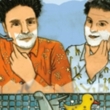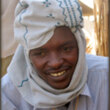A Long Way Gone: Memoirs of a Boy Soldier
(Libby/OverDrive eBook, Kindle)
Available Platforms
Description
More Details
Excerpt
Similar Titles From NoveList
Similar Authors From NoveList
Published Reviews
Booklist Review
"We went to work killing everyone in sight. We didn't waste a single bullet." The prose is flat, almost detached, as the writer speaks quietly of what he witnessed, and what he did, as a young teen soldier in Sierra Leone. It could be a kids' war game, but it was real. On the run in 1993 after the rebels ("freedom fighters") invaded his town and killed his parents, the 12-year-old sees massacre up close: heads chopped off, people burned alive. A year later, recruited by the army to get revenge ("think of it as . . . the highest service you can perform for your country "), always drugged, he becomes a perpetrator. At 15, he is rescued by a UN committee, which helps him slowly confront the trauma and begin to recover; then he is brought to the UN in New York to bear witness. A final note tells you he graduated from Oberlin College. One boy's horrific memoir captures the reality of those distant news pictures of kids with guns somewhere in Africa. HazelRochman.
Publisher's Weekly Review
This absorbing account by a young man who, as a boy of 12, gets swept up in Sierra Leone's civil war goes beyond even the best journalistic efforts in revealing the life and mind of a child abducted into the horrors of warfare. Beah's harrowing journey transforms him overnight from a child enthralled by American hip-hop music and dance to an internal refugee bereft of family, wandering from village to village in a country grown deeply divided by the indiscriminate atrocities of unruly, sociopathic rebel and army forces. Beah then finds himself in the army-in a drug-filled life of casual mass slaughter that lasts until he is 15, when he's brought to a rehabilitation center sponsored by UNICEF and partnering NGOs. The process marks out Beah as a gifted spokesman for the center's work after his "repatriation" to civilian life in the capital, where he lives with his family and a distant uncle. When the war finally engulfs the capital, it sends 17-year-old Beah fleeing again, this time to the U.S., where he now lives. (Beah graduated from Oberlin College in 2004.) Told in clear, accessible language by a young writer with a gifted literary voice, this memoir seems destined to become a classic firsthand account of war and the ongoing plight of child soldiers in conflicts worldwide. (Feb.) (c) Copyright PWxyz, LLC. All rights reserved
School Library Journal Review
Adult/High School-This gripping story by a children's-rights advocate recounts his experiences as a boy growing up in Sierra Leone in the 1990s, during one of the most brutal and violent civil wars in recent history. Beah, a boy equally thrilled by causing mischief as by memorizing passages from Shakespeare and dance moves from hip-hop videos, was a typical precocious 12-year-old. But rebel forces destroyed his childhood innocence when they hit his village, driving him to leave his home and travel the arid deserts and jungles of Africa. After several months of struggle, he was recruited by the national army, made a full soldier and learned to shoot an AK-47, and hated everyone who came up against the rebels. The first two thirds of his memoir are frightening: how easy it is for a normal boy to transform into someone as addicted to killing as he is to the cocaine that the army makes readily available. But an abrupt change occurred a few years later when agents from the United Nations pulled him out of the army and placed him in a rehabilitation center. Anger and hate slowly faded away, and readers see the first glimmers of Beah's work as an advocate. Told in a conversational, accessible style, this powerful record of war ends as a beacon to all teens experiencing violence around them by showing them that there are other ways to survive than by adding to the chaos.-Matthew L. Moffett, Pohick Regional Library, Burke, VA (c) Copyright 2010. Library Journals LLC, a wholly owned subsidiary of Media Source, Inc. No redistribution permitted.
Library Journal Review
(See Prepub Alert, LJ 11/15/06).AAnn Kim (c) Copyright 2010. Library Journals LLC, a wholly owned subsidiary of Media Source, Inc. No redistribution permitted.
Kirkus Book Review
The survivor of a dirty war in starkest Africa recounts his transition from 12-year-old orphan to killing machine. To emerge from Sierra Leone's malignant civil conflict and eventually graduate from college in the U.S. marks Beah as very unusual, if not unique. His memoir seeks to illuminate the process that created, and continues to create, one of the most pitiable yet universally feared products of modern warfare: the boy soldier. It illustrates how, in African nations under the stress of open civil war, youthful males cluster in packs for self-protection, fleeing the military forces of all sides, distrusted and persecuted by strangers they encounter, until they are killed or commandeered as recruits. Nearly half the text deals with Beah's life as a fugitive after marauding rebel troops ravaged his home village. He fled with several other boys, but they were separated during another attack and he was forced to spend several weeks alone in the bush; the loneliness there instilled a craving for human companionship of any type. The regular military finally snared Beah and some new companions, telling them they must train as soldiers or die. The rebels, they were assured, were responsible for killing their families and destroying their homes; as soldiers, they would exact manly revenge and serve the nation. Cocaine, marijuana and painkillers became the boys' mind-numbing daily diet. They were indoctrinated by practicing mayhem on tethered prisoners and became willing experts at lying in ambush with their aging AK-47 rifles. For them, killing human beings had replaced ordinary child's play. Beah's halting narrative has confusing time shifts, but it's hideously effective in conveying the essential horror of his experiences. Copyright ©Kirkus Reviews, used with permission.
Library Journal Reviews
In this real-life Beasts of No Nation, Beah details his experience as a 13-year-old compelled by government forces in his native Sierra Leone to pick up an AK-47. Now he's a member of the Human Rights Watch Children's Division Advisory Committee. Copyright 2006 Reed Business Information.
Library Journal Reviews
It is common in war memoirs to read stories of soldiers leaving for war as 18-year-old boys and returning aged. In the case of savage wars occurring in Africa, children who are forced into service and often drugged are used as pawns in urban combat. Beah portrays a particularly ugly side of battle.
[Page 47]. (c) Copyright 2016 Library Journals LLC, a wholly owned subsidiary of Media Source, Inc. No redistribution permitted.Publishers Weekly Reviews
This absorbing account by a young man who, as a boy of 12, gets swept up in Sierra Leone's civil war goes beyond even the best journalistic efforts in revealing the life and mind of a child abducted into the horrors of warfare. Beah's harrowing journey transforms him overnight from a child enthralled by American hip-hop music and dance to an internal refugee bereft of family, wandering from village to village in a country grown deeply divided by the indiscriminate atrocities of unruly, sociopathic rebel and army forces. Beah then finds himself in the army—in a drug-filled life of casual mass slaughter that lasts until he is 15, when he's brought to a rehabilitation center sponsored by UNICEF and partnering NGOs. The process marks out Beah as a gifted spokesman for the center's work after his "repatriation" to civilian life in the capital, where he lives with his family and a distant uncle. When the war finally engulfs the capital, it sends 17-year-old Beah fleeing again, this time to the U.S., where he now lives. (Beah graduated from Oberlin College in 2004.) Told in clear, accessible language by a young writer with a gifted literary voice, this memoir seems destined to become a classic firsthand account of war and the ongoing plight of child soldiers in conflicts worldwide. (Feb.)
[Page 55]. Copyright 2006 Reed Business Information.School Library Journal Reviews
Adult/High School— This gripping story by a children's-rights advocate recounts his experiences as a boy growing up in Sierra Leone in the 1990s, during one of the most brutal and violent civil wars in recent history. Beah, a boy equally thrilled by causing mischief as by memorizing passages from Shakespeare and dance moves from hip-hop videos, was a typical precocious 12-year-old. But rebel forces destroyed his childhood innocence when they hit his village, driving him to leave his home and travel the arid deserts and jungles of Africa. After several months of struggle, he was recruited by the national army, made a full soldier and learned to shoot an AK-47, and hated everyone who came up against the rebels. The first two thirds of his memoir are frightening: how easy it is for a normal boy to transform into someone as addicted to killing as he is to the cocaine that the army makes readily available. But an abrupt change occurred a few years later when agents from the United Nations pulled him out of the army and placed him in a rehabilitation center. Anger and hate slowly faded away, and readers see the first glimmers of Beah's work as an advocate. Told in a conversational, accessible style, this powerful record of war ends as a beacon to all teens experiencing violence around them by showing them that there are other ways to survive than by adding to the chaos.—Matthew L. Moffett, Pohick Regional Library, Burke, VA
[Page 171]. Copyright 2007 Reed Business Information.Reviews from GoodReads
Citations
Beah, I. (2007). A Long Way Gone: Memoirs of a Boy Soldier . Farrar, Straus and Giroux.
Chicago / Turabian - Author Date Citation, 17th Edition (style guide)Beah, Ishmael. 2007. A Long Way Gone: Memoirs of a Boy Soldier. Farrar, Straus and Giroux.
Chicago / Turabian - Humanities (Notes and Bibliography) Citation, 17th Edition (style guide)Beah, Ishmael. A Long Way Gone: Memoirs of a Boy Soldier Farrar, Straus and Giroux, 2007.
Harvard Citation (style guide)Beah, I. (2007). A long way gone: memoirs of a boy soldier. Farrar, Straus and Giroux.
MLA Citation, 9th Edition (style guide)Beah, Ishmael. A Long Way Gone: Memoirs of a Boy Soldier Farrar, Straus and Giroux, 2007.
Copy Details
| Collection | Owned | Available | Number of Holds |
|---|---|---|---|
| Libby | 1 | 1 | 0 |




































